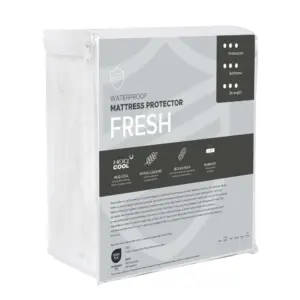The Easiest Way to Improve Sleep Quality with AI
How AI Can Help You Sleep Better
In today’s fast-paced world, the quest for quality sleep has become more vital than ever. Sleep is intrinsic to our well-being, influencing everything from mental clarity to physical health. Fortunately, Artificial Intelligence (AI) is stepping in to revolutionize how we approach this essential need. With AI-driven tools and technologies, improving sleep quality has never been easier. Here’s a closer look at how AI can enhance your sleep experience through innovative devices and personalized recommendations.
AI-Powered Sleep Trackers: Your Sleep Companion
AI-powered sleep trackers are changing the landscape of sleep monitoring. These advanced devices utilize sophisticated algorithms to analyze your sleep patterns, offering personalized insights and recommendations to boost your rest quality. Notable options include:
Yawnder Sleep Tracker: This device employs AI to closely monitor your sleep stages—light, deep, REM, and wakefulness. It provides daily suggestions tailored to your sleep habits, like optimal bedtimes and relaxation techniques.
Sleepio: An AI-driven app that incorporates cognitive behavioral therapy (CBT) techniques, Sleepio tailors a sleep plan based on your specific needs, helping to combat challenges like insomnia.
Belun Ring: More than just a sleep tracker, this wearable device tracks vital metrics such as heart rate, blood oxygen levels, and movement during sleep. With AI analyzing this data, the ring generates a sleep score alongside personalized advice for improvement.
AI sleep scoring is critical in understanding how much restorative sleep you’re actually getting. For instance, the Belun Ring not only identifies different sleep stages but also offers actionable feedback, allowing you to optimize your nights.
AI-Enhanced Sleep Masks: A New Way to Drift Off
Another exciting advancement is the emergence of AI-enhanced sleep masks, which provide unique benefits for achieving quality sleep:
Yawnder Smart Sleep Mask: This innovative mask utilizes EEG and AI technology to monitor your brain activity and adjust its features. It can emit calming sounds or vibrations, facilitating quicker entrance into deeper sleep.
Bluetooth Connectivity: Many sleep masks, including the Yawnder Smart Sleep Mask, feature Bluetooth connectivity, enabling synchronization with your smartphone. This allows for personalized routines and real-time tweaks based on sleep data.
Thanks to EEG sensors, these masks can detect your brain waves in real time. If they sense you are in light sleep, the mask could gently introduce white noise to help you transition to a deeper sleep state.
Wearable Devices: The Future of Sleep Monitoring
Wearable technology has elevated sleep monitoring to new realms by providing continuous tracking and advanced AI capabilities. Devices like the Yawnder Sleep Tracker facilitate around-the-clock monitoring, supplying actionable insights aimed at enhancing your sleep quality.
Wearable Sleep Devices: The Yawnder Health Watch not only tracks your heart rate and oxygen levels but can also identify sleep apnea. The AI algorithms analyze this information to deliver comprehensive sleep reports.
Medical Devices: FDA-approved devices like ARES and ApneaLink focus on diagnosing sleep disorders such as Obstructive Sleep Apnea (OSA). Leveraging AI, these tools analyze breathing patterns, oxygen saturation, and other metrics, highlighting irregularities for healthcare providers.
AI in Diagnosing Sleep Disorders: A Game Changer
The capability of AI to analyze large datasets quickly makes it particularly effective in diagnosing sleep disorders.
Obstructive Sleep Apnea (OSA): AI algorithms can sift through sleep data to detect patterns indicative of OSA, enabling swift identification and potential treatment pathways.
Broader Sleep-Related Issues: AI can also assist in diagnosing a range of sleep-related breathing problems by pinpointing irregularities in your data that may escape human analysis.
Personalized Sleep Recommendations: Tailoring Your Experience
AI-driven sleep apps like Yawnder Sleep Coach transform your ability to manage sleep through personalized suggestions based on your lifestyle and emotional states.
Customized Sleep Routines: Yawnder creates tailored sleep plans factoring in your daily activities, stress levels, and even dietary habits, elevating your quality of rest.
Smart Mattresses and Bedding: Comfort Meets Technology
AI extends beyond apps and trackers into our very beds. Smart mattresses utilize AI to adjust their settings in real time, creating a tailored sleeping environment.
Yawnder Smart Mattress and Mattress Topper: Equipped with AI sensors, these products monitor your movements and adjust firmness as needed, ensuring maximum comfort throughout the night.
Addressing Potential Concerns with AI in Sleep Medicine
While the advantages of AI are clear, there are valid concerns that merit attention.
Bias and Accuracy: It’s crucial to ensure AI systems utilize a diverse array of data to avoid biases. Clinician involvement remains essential for interpreting AI data accurately and effectively.
Data Privacy: As AI requires sensitive health data, strict regulatory safeguards must be in place to protect patient information and ensure trust in the technology.
Conclusion
The integration of AI into sleep improvement initiatives provides significant potential for transforming sleep quality. By utilizing AI-powered trackers, smart sleep masks, and personalized recommendations, individuals can take proactive steps toward achieving a better night’s rest.
As technologies evolve, the promise of AI extends to more innovative solutions for sleep challenges, making restful and rejuvenating sleep a viable goal for everyone. To explore personalized sleep advice and discover how AI can help you sleep better, consider utilizing solutions like the Yawnder Sleep Study.
By embracing the power of AI, we can pave the way toward a future where deep, restorative sleep is within everyone’s reach.













